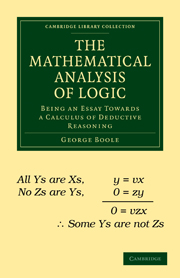Summary
A hypothetical Proposition is defined to be two or more categoricals united by a copula (or conjunction), and the different kinds of hypothetical Propositions are named from their respective conjunctions, viz. conditional (if), disjunctive (either, or), &c.
In conditionals, that categorical Proposition from which the other results is called the antecedent, that which results from it the consequent.
Of the conditional syllogism there are two, and only two formulae.
1st. The constructive,
If A is B, then C is D,
But A is B, therefore C is D.
2nd. The Destructive,
If A is B, then C is D,
But C is not D, therefore A is not B.
A dilemma is a complex conditional syllogism, with several antecedents in the major, and a disjunctive minor.
If we examine either of the forms of conditional syllogism above given, we shall see that the validity of the argument does not depend upon any considerations which have reference to the terms A, B, C, D, considered as the representatives of individuals or of classes. We may, in fact, represent the Propositions A is B, C is D, by the arbitrary symbols X and Y respectively, and express our syllogisms in such forms as the following:
If X is true, then Y is true,
But X is true, therefore Y is true.
Thus, what we have to consider is not objects and classes of objects, but the truths of Propositions, namely, of those elementary Propositions which are embodied in the terms of our hypothetical premises.
- Type
- Chapter
- Information
- The Mathematical Analysis of LogicBeing an Essay Towards a Calculus of Deductive Reasoning, pp. 48 - 59Publisher: Cambridge University PressPrint publication year: 2009First published in: 1847

